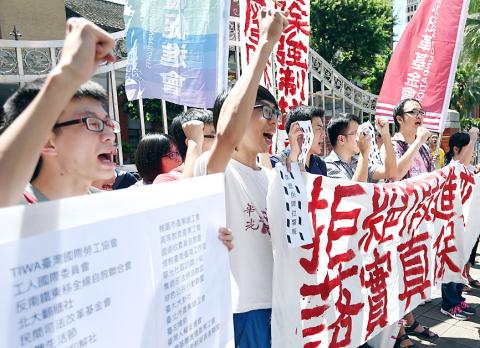Representatives of dozens of civic groups yesterday staged a rally in front of the Legislative Yuan calling on lawmakers to remove provisions restricting people’s right to protest, including maintaining restricted zones and police discretion over where demonstrations can be held.
The legislature is expected to clear some major amendments to the Assembly and Parade Act (集會遊行法) before the legislative session ends on Friday.
The proposed amendments include the scrapping the need to apply for a permit or to notify authorities before staging a demonstration, and changing the name of the law to the “assembly and parade protection act,” which is meant to highlight the transformation from a government-centered law to a people-centered one.

Photo: Chu Pei-hsiung, Taipei Times
Dozens of activist groups, including the Taiwan Association for Human Rights, the Taiwan International Workers’ Association, the Taiwan Alliance for Victims of Urban Renewal, the National Alliance for Workers of Closed Factories, the Judicial Reform Foundation (JRF) and the Huaguang Community Canvassing Working Group, said the proposed name change is a “false gesture of progressiveness” by the Democratic Progressive Party (DPP) and called on the party and other caucuses to “ensure real protection for demonstrators.”
The legislature’s Internal Administration Committee in May passed proposed amendments to the act, but maintained restrictions on protests being held around government buildings and police’s right to disperse demonstrators. The amendments went through cross-caucus negotiations early this month.
The groups urged the caucuses to abolish both regulations, “as they amount to conferring equal power to the government as it had before for limiting and impeding people’s rights to assembly and parade.”
JRF researcher Ho Yu-lun (何友倫) questioned the appropriateness of setting restricted zones around certain government buildings and hospitals, saying: “The front gate of the Legislative Yuan, where we are gathered today, is just a street away from the National Taiwan University Children Hospital and is within the supposed restricted zone; if we are not allowed to protest here, where can we hold a protest?
Alliance for Workers of Closed Factories member Lu Chyi-horng (盧其宏) said the government has failed to see that authorities have in recent years started to favor using the Criminal Code (刑法) over the Assembly and Parade Act to arrest and prosecute demonstrators, as he called on lawmakers to ensure that the new amendments would disallow that.
As an example, five people protesting the forced demolition of Taipei’s Huaguang Community — who according to the groups did nothing physically or verbally violent — were arrested and charged with obstructing official duties in April 2013. On June 15, they were sentenced to 50 days of detention that is commutable to a fine of NT$1,000 per day.
“It is proof that the government has been abusing the judiciary to oppress social activism,” said Lin Ching-hao (林靖豪), one of the five defendants.
The New Power Party has been the sole party caucus that has responded positively to their calls, the groups said.
NPP Legislator Freddy Lim (林昶佐) showed up at the press conference to voice his support.
At the end of the news conference, the protesters turned around to face the front gate of the Legislative Yuan and hurled buzzers over the gate to signal “warnings that people have insufficient protection from the new assembly and parade act.”

The manufacture of the remaining 28 M1A2T Abrams tanks Taiwan purchased from the US has recently been completed, and they are expected to be delivered within the next one to two months, a source said yesterday. The Ministry of National Defense is arranging cargo ships to transport the tanks to Taiwan as soon as possible, said the source, who is familiar with the matter. The estimated arrival time ranges from late this month to early next month, the source said. The 28 Abrams tanks make up the third and final batch of a total of 108 tanks, valued at about NT$40.5 billion

A group from the Taiwanese Designers in Australia association yesterday represented Taiwan at the Midsumma Pride March in Melbourne. The march, held in the St. Kilda suburb, is the city’s largest LGBTQIA+ parade and the flagship event of the annual Midsumma Festival. It attracted more than 45,000 spectators who supported the 400 groups and 10,000 marchers that participated this year, the association said. Taiwanese Designers said they organized a team to march for Taiwan this year, joining politicians, government agencies, professionals and community organizations in showing support for LGBTQIA+ people and diverse communities. As the first country in Asia to legalize same-sex

MOTIVES QUESTIONED The PLA considers Xi’s policies toward Taiwan to be driven by personal considerations rather than military assessment, the Epoch Times reports Chinese President Xi Jinping’s (習近平) latest purge of the Chinese People’s Liberation Army (PLA) leadership might have been prompted by the military’s opposition to plans of invading Taiwan, the Epoch Times said. The Chinese military opposes waging war against Taiwan by a large consensus, putting it at odds with Xi’s vision, the Falun Gong-affiliated daily said in a report on Thursday, citing anonymous sources with insight into the PLA’s inner workings. The opposition is not the opinion of a few generals, but a widely shared view among the PLA cadre, the Epoch Times cited them as saying. “Chinese forces know full well that

Travel agencies in Taiwan are working to secure alternative flights for travelers bound for New Zealand for the Lunar New Year holiday, as Air New Zealand workers are set to strike next week. The airline said that it has confirmed that the planned industrial action by its international wide-body cabin crew would go ahead on Thursday and Friday next week. While the Auckland-based carrier pledged to take reasonable measures to mitigate the impact of the workers’ strike, an Air New Zealand flight arriving at Taipei from Auckland on Thursday and another flight departing from Taipei for Auckland on Saturday would have to